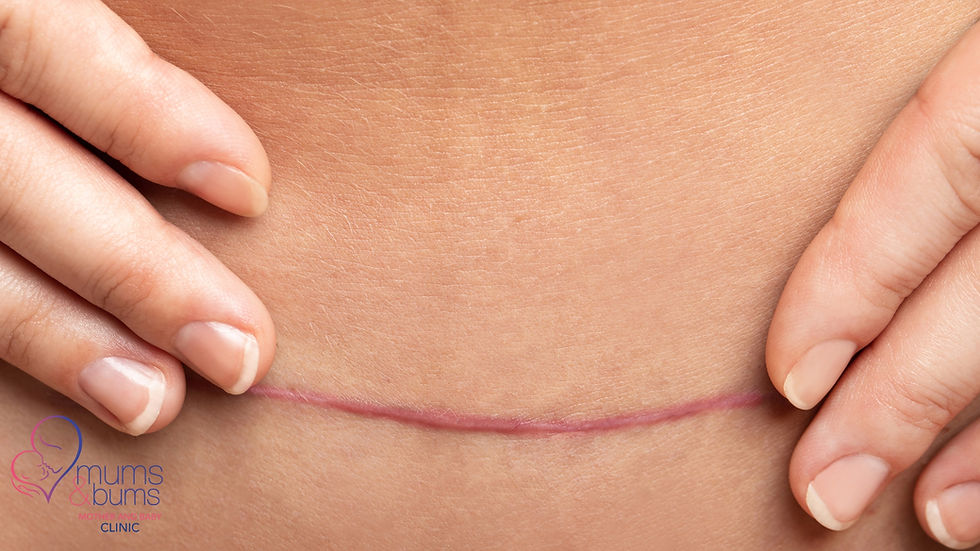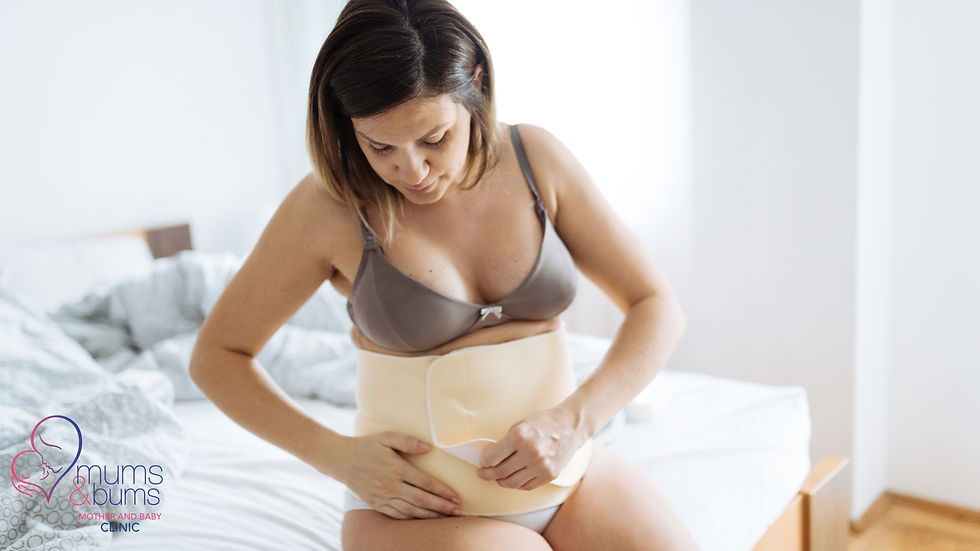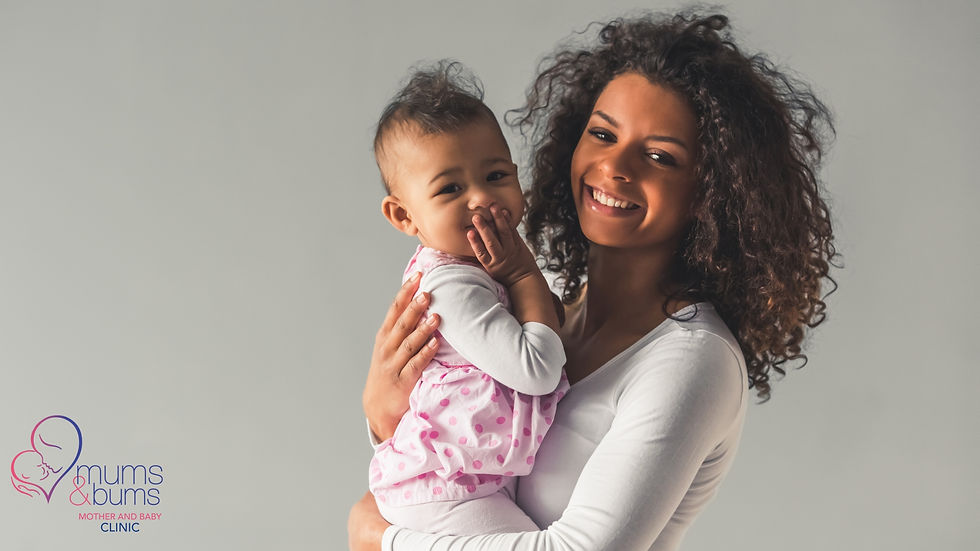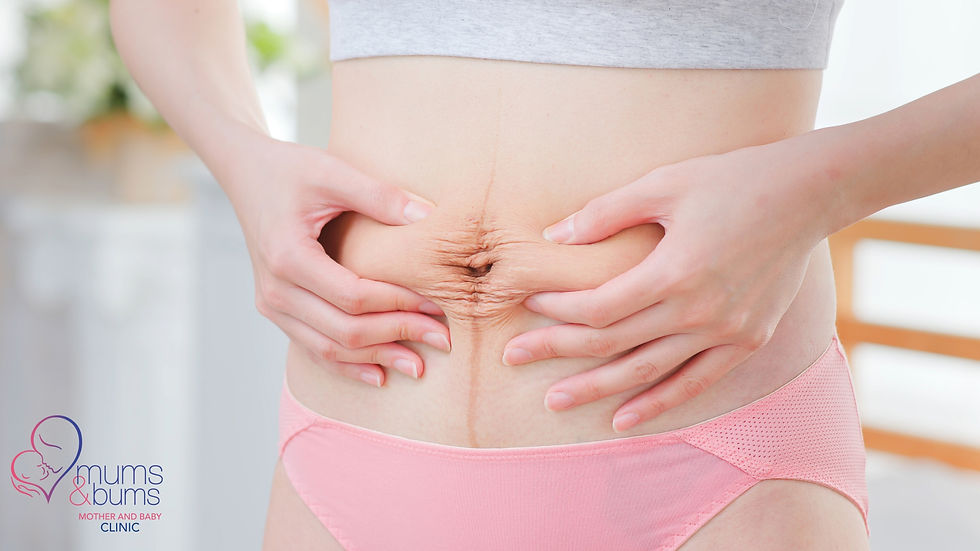Recovery After Birth: How Long Should It Take and What’s Not Normal?
- Samantha Pieterse
- Apr 4
- 9 min read
Updated: 4 days ago
So, you’ve had your baby, and your big tummy is gone (mostly). Usually, this is where everyone assumes you’re back to “normal.” Except your body feels like it’s been run over by a train, your hormones are all over the place, and you probably don’t even want to talk about your pelvic floor. Welcome to postpartum recovery: a phase of becoming a parent that’s as important as pregnancy but also one that is so often underestimated.
Whether you had a vaginal birth, C-section, stitches, or tears (the physical and emotional kind), recovery isn’t ever one-size-fits-all.
Here’s an honest guide to what you can expect while you recover after birth. We’re going to talk about what’s to be expected, what’s not, and when it’s time to get professional help. Remember, you're not alone, and help is always available when you need it.
Want a quick way to track your recovery week by week? Download our free Postpartum Recovery Checklist.

Week 1 After After Birth: What to Expect in the First 7 Days
Week one is raw and messy in every possible way. You're meeting your baby and yourself (the mom) for the first time, all while your body feels like it’s been through the trenches.
What’s Happening in Your Body:
Lochia: This is postpartum bleeding, and it’s heavier than your normal period. You’ll see bright red blood that may have small clots, which are totally normal in the early days (but we don’t want anything bigger than a golf ball). Pads only, no tampons or menstrual cups, until cleared by your provider.
Uterine cramps/contractions (a.k.a. afterpains): These pains feel like period cramps (a little like early contractions). They happen as your uterus shrinks back to its normal size after birth. They may feel worse when you breastfeed due to the hormone oxytocin.
Sore perineum or stitches: Whether you tore, were cut (episiotomy), or just birthed a bowling ball-sized baby, you’re likely sore down there. Keep an eye out for infection and keep doing the salt water washes.
C-section recovery: You’re dealing with a fresh abdominal wound, and it probably hurts to laugh, cough, or move. Keep a pillow by you at all times to support your wound when you do those things.
Breast changes: After the colostrum, your milk will start to come in around day 3–5, and your breasts may become firm, hot, or tender (a.k.a. engorgement). Keep a warm compress nearby and feed your baby often.
How You Might Feel Emotionally:
You might cry for no reason. That’s normal. So is laughing mid-cry.
You may feel overwhelmed, elated, terrified, or a mix of all three.
You might not “bond instantly” with your baby, and that’s okay.
Tips for Week 1:
Use a peri bottle for rinsing after bathroom trips
Apply witch hazel pads (“padsicles”) or cooling gel to soothe soreness down there.
Accept help: food drops, baby holding, or laundry folding.
Stay hydrated, especially if you’re breastfeeding.
Rest when the baby sleeps... or at least recline and scroll a little
If you need postpartum care or breastfeeding support, make an appointment at Mums & Bums today!

Weeks 2–6 After Birth: Healing, Hormones & What’s Normal
The newborn fog is probably a little better, but you’re still healing and adjusting to life outside the bump.
Physical Recovery:
Bleeding: Lochia changes from red to pink or brown and becomes lighter. If it gets heavier suddenly, you may be overdoing it, or something is wrong. If this happens, check in with your provider just to be sure.
C-section moms: Your incision might start to itch, and feeling some tightness is expected. Pain that worsens or weeping from the wound isn’t normal. Flag that.
Stitches: Dissolvable stitches should have dissolved by now. Itchiness is normal; foul smells, redness, or swelling are not.
Pelvic heaviness or discomfort: If you feel like your insides are falling out, you could have mild prolapse, which is common but treatable.
Bowel movements: Still holding your breath every time you poop? Totally understandable. Get yourself some fiber and a stool softener to help.
Emotional Recovery:
Baby blues typically settle by week 2–3. So, if you’ve been feeling a bit down, you might start to feel better around about now.
If the sadness lingers, or you feel anxious, irritable, or disconnected, it might be postpartum depression or anxiety. You’re not alone, and you can get help. If you’re wondering if you might have postpartum depression, take our self-assessment quiz.
Tips for Weeks 2–6:
Start with light movement (e.g., gentle, slow walks or postnatal yoga)
Try some pelvic floor exercises (think: squeeze like you’re stopping a wee)
Eat nutritious, iron-rich meals for healing and energy.
Schedule your 6-week postpartum check-up.

Week 6+ After Birth: What You’re Ready For
Around six weeks, you will usually have an appointment with your GP, midwife, or gynecologist for your post-birth check-up. It’s usually at this appointment that you’re “cleared for sex, exercise, and driving,” but many new moms don’t feel ready for any of those things, and that’s also okay.
Physical Reality:
Sex: Your libido might be in hiding, and weirdly enough, that’s normal. Vaginal dryness (especially if breastfeeding), scar tenderness, or body image issues can all make you feel like you’re not ready for sex.
Exercise: Start with low-impact workouts and work your way up to more intensive exercise. If something doesn’t feel right, don’t push through it. Get help.
Leaks: Do you leak a little pee when you laugh or sneeze? I know it’s embarrassing (no, really, I know). It's super common, but you don’t need to struggle with it. If you are having pelvic floor issues, get help from a pelvic floor physio. They’re amazing!
C-section recovery: Your scar may feel numb, tingly, or tight. Massaging it gently with a clean hand and moisturizer can help with this.
Mental Health Check:
You’re doing more, maybe too much. It’s okay to stay in and avoid visitors.
If you're feeling angry, anxious, or like you shouldn’t be allowed to look after your baby alone, talk to a professional early. Postpartum depression is serious, and it’s not a reflection of you.
Tips for 6 Weeks+:
Don’t feel pressure to “bounce back.” Your body knows what it’s doing.
Talk to your partner about how you’re feeling, emotionally and physically.
If you're struggling with movement or pain, invest in a postnatal fitness program or get help from a physio. It can make a world of difference!
Book a check-in with a pelvic floor specialist, even if all feels well.

3–6 Months After Birth: Recovery, Milestones, & Setbacks
Between 3 and 6 months after you give birth, you might (finally) be sleeping for slightly longer stretches (we see you, 4 a.m. feed!) or adjusting to your new work routine, but that doesn’t mean your body is done healing.
Physical Changes:
Ab strength may still be weak, but diastasis recti (ab separation) is common and fixable. Seek help if you need it.
Back, hip, or neck pain is often caused by baby-carrying, feeding posture, or pushing a pram uphill. See a chiropractor and focus on how you sit, lie, and feed your baby.
Your period might return, especially if you’re formula feeding or your baby sleeps longer stretches. Initially, your periods may be heavier, lighter, or slightly different than what you’re used to.
Your Emotions:
Your hormones are still returning to normal.
You may feel super happy and exhausted at the same time.
Some new moms feel “left behind” socially or in their careers, while others feel super focused. Both are normal.
Your Relationship:
The intimacy in your relationship may still feel a bit off. Being exhausted, plus breastfeeding hormones, isn’t going to help with intimacy.
Postpartum rule 1: communicate. Don’t let resentment towards your partner build up. Talk through your feelings, even if you don’t feel like it.
Tips for Surviving Months 3–6:
Find a mom support group (online or in-person).
Start gentle strength training or pilates.
Talk to a therapist or counselor if emotional recovery is slower than expected.
Plan some “me time” each week. Even if it’s just 30 minutes, take a long bath and shave your legs.

How Long Does Recovering After Birth Take?
Let’s quickly bust a myth. The six-week postpartum “all-clear” does not mean you’re fully healed. In fact, many experts and many moms agree that true postpartum recovery takes closer to 6 to 12 months, and some aspects of recovery take even longer, not just physically but hormonally, emotionally, mentally, and socially.
So if you're three months in, still in maternity leggings, and wondering why your hormones feel like they’re throwing a party without your permission, you're not behind. You're in the thick of it, and that's completely normal.
Let’s have a quick look at what “back to normal” really means and what the research says about each part of postpartum recovery.
1. Postpartum Hormones: The Wild Ride
The hormonal shift after childbirth is massive. In fact, the postpartum hormone drop is considered to be the single largest sudden hormone change in the shortest amount of time for any human being at any point of their life cycle.
Estrogen and progesterone levels, which were sky-high during pregnancy, drop dramatically within 24 hours of delivery. This crash is what helps trigger milk production, but it also explains why many women feel emotional or even a bit lost in the first weeks.
According to a review published in the Journal of Clinical Endocrinology and Metabolism, most postpartum hormones stabilize around 6–12 weeks, but some, especially if you're breastfeeding, stay altered for as long as you're making milk.
What’s normal:
Oxytocin spikes during breastfeeding for bonding, uterine shrinking, and healing.
Prolactin stays elevated with frequent nursing.
Estrogen and progesterone remain lower, which can cause dryness, mood swings, and low libido.
When you might feel more balanced:
Around 3 - 4 months if you are formula-feeding.
Around 6 months or more if you are breastfeeding, depending on frequency and weaning.
IMPORTANT! You may not feel emotionally or hormonally like “your old self” for 6 months to a year, and that’s not a flaw. It’s biology.
2. Postpartum Weight Loss: There’s No One Timeline
Let’s get this straight: “bouncing back” is a marketing term, not a medical one. You will lose some weight immediately after birth because the baby, placenta, and fluid weigh something. After that, your weight loss slows down, and how your body changes depends on so many things, including genetics, breastfeeding, sleep (lol), diet, stress, and your activity levels.
The averages (according to a 2015 study in Obstetrics & Gynecology):
Initial loss: 5–6kg (baby, placenta, fluids)
By 6 weeks: Most women lose 50–60% of their pregnancy weight.
By 6 months: Around 70% return to pre-pregnancy weight
By 12 months: 87% are close, but 25% retain more than 5kg.
Some women lose weight faster while breastfeeding, while others hang on to the excess weight until weaning (thanks to prolactin and fat stores). If you’re not losing weight quickly, remember that your body’s priority right now is healing and milk production, not weight loss.
3. When Will Your Period Come Back After Birth?
When your period will start again depends on whether you’re breastfeeding or not:
Exclusively breastfeeding: Your period may not come back for 6 months or more
Mixed or formula feeding: Your period can come back from as early as 6–10 weeks postpartum
A study published in Fertility and Sterility showed that prolactin (the milk-making hormone) suppresses ovulation. So, the more often you nurse, the longer it can delay your period. That said, some moms get surprise cycles even while breastfeeding day and night, so don’t rely on breastfeeding as birth control.
HEADS UP: your first few periods may be heavier, irregular, or painful than what you're used to. It’s just your body recalibrating.
4. Pelvic Floor & Core: A Slow but Steady Recovery
Your core and pelvic floor muscles go through so much during pregnancy and birth, regardless of if you had a vaginal birth or C-section. According to physiotherapy research, diastasis recti (ab separation) occurs in over 60% of postpartum women and can take up to a year or more to fully resolve, depending on the degree and intervention.
Pelvic floor symptoms like leaking, heaviness, or pain are super common, especially in the first few months, but don’t worry, you don't have to live with them forever, and they eventually resolve.
What helps:
Seeing a pelvic health physiotherapist (even just for one or two sessions!)
Starting core and floor rehab around 6–8 weeks, if cleared
Avoiding high-impact exercise until your body is truly ready (usually after 3–4 months, or longer for some)
5. Mental and Emotional Recovery: The Longest Journey of All
This one doesn’t get enough airtime. You can heal physically but still feel like you’re adjusting emotionally because you are. In fact, many psychologists suggest that full emotional recovery after birth can take a year or more, especially if your experience includes birth trauma, NICU time, or mental health struggles.
The World Health Organization recognizes postpartum depression as a serious condition that affects 10–15% of moms globally, though experts believe the number may be higher due to underreporting. And it doesn’t always look like sadness. It can be rage, anxiety, or feeling emotionally numb.
If you still don’t feel like yourself after three months, you’re not “crazy. " You’re not alone, and help is available.

TL;DR - Recovery After Birth: The Timeline Summary
Body System | Typical Recovery Timeline |
Hormones | 6 weeks – 6+ months (longer if breastfeeding) |
Period return | 6 weeks – 12 months (varies based on feeding) |
Weight & body composition | 6 months – 1 year+ |
Core strength | Gradual improvement over 6–12 months |
Pelvic floor function | 3–12 months (with physio support if needed) |
Emotional wellbeing | 6 months – 2 years (ongoing support helps) |
Be Kind To Yourself
You don’t need to “get your body back.” You never lost it. It’s just been incredibly busy doing one of the most demanding jobs on earth.
Give yourself time. Speak to other moms. Seek help when you need it. And if you’re ever unsure about what you’re feeling, physically or emotionally, there’s no harm in checking in with your GP, midwife, or therapist.
Final Thoughts
If you remember one thing from this post, let it be this: Postpartum recovery is a marathon, not a sprint. Your body grew, birthed, and is now keeping a tiny human alive. That’s amazing.
Trust your instincts, don’t downplay what you’re feeling, and know that asking for help isn’t a sign of weakness.














So interesting!